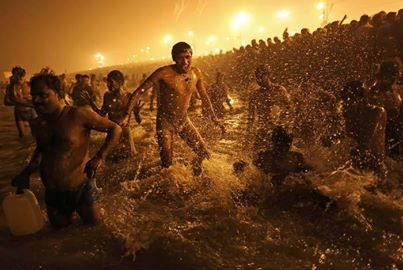 London, Feb 19: In May and June when millions of pilgrims throng Rishikesh and Haridwar in Uttarakhand to take holy dip, levels of antibiotic-resistant 'superbugs' have been found 60 times greater than other times of the year, shows research.
London, Feb 19: In May and June when millions of pilgrims throng Rishikesh and Haridwar in Uttarakhand to take holy dip, levels of antibiotic-resistant 'superbugs' have been found 60 times greater than other times of the year, shows research.After studying water samples taken from the upper Ganges river, experts from the Indian Institute of Technology in Delhi (IIT-Delhi) and Newcastle University, Britain, revealed that the spread of antibiotic-resistance to one of the most pristine locations in Asia is linked to the annual human pilgrimages to the region.
"This is not a local problem - it is a global one," said Professor David Graham, an environmental engineer from Newcastle University in Britain.
"We focused on pilgrimage areas because we suspected such locations would provide new information about resistance transmission via the environment," he added.
The specific resistance gene called 'blaNDM-1' causes extreme multi-resistance in many bacteria, therefore, it must be understood how this gene spreads in the environment.
By comparing water quality of the upper Ganges, the team showed that levels of 'blaNDM-1' were 20 times higher per capita during the pilgrimage season than at other times.
Monitoring levels of other contaminants in the water, the team showed that overloading of waste treatment facilities was likely to blame and that in many cases, untreated sewage was going straight into the river where the pilgrims bathe.
"The bugs and their genes are carried in people's guts. If untreated wastes get into the water supply, resistance potential in the wastes can pass to the next person and spiralling increases in resistance can occur," the researchers warned.
"If we can stem the spread of such antibiotic resistant genes locally - possibly through improved sanitation and waste treatment - we have a better chance of limiting their spread on larger scales," contended Grahem who has spent over 10 years studying the environmental transmission of antibiotic resistance around the world.
The concern is growing worldwide over the threat from bacteria that are resistant to the so-called 'last resort' class of antibiotics known as Carbapenems - especially if resistance is acquired by aggressive pathogens.
The research team are now calling on governments around the world to recognise the importance of clean drinking water in their fight against antibiotic resistance.
They argue that preventing the spread of resistance genes that promote life-threatening bacteria could be achieved by improving waste management at key pilgrimage sites.
The team has returned to Rishikesh and Haridwar, hoping that their work would prompt public action to improve local sanitation.
Through the overuse of antibiotics, contamination of drinking water and other factors, the humans have exponentially accelerated the rate at which superbugs might develop, said the report published in the journal Environmental Science and Technology.





Comments
Add new comment